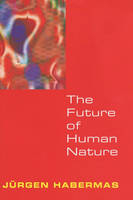
The Future of Human Nature
Seiten
2003
Polity Press (Verlag)
978-0-7456-2986-5 (ISBN)
Polity Press (Verlag)
978-0-7456-2986-5 (ISBN)
In this book Jurgen Habermas - the most influential philosopher and social thinker in Germany today - takes up the question of genetic engineering and its ethical implications and subjects it to careful philosophical scrutiny.
Recent developments in biotechnology and genetic research are raising complex ethical questions concerning the legitimate scope and limits of genetic intervention. As we begin to contemplate the possibility of intervening in the human genome to prevent diseases, we cannot help but feel that the human species might soon be able to take its biological evolution in its own hands. ‘Playing God’ is the metaphor commonly used for this self-transformation of the species, which, it seems, might soon be within our grasp.
In this important new book, Jürgen Habermas – the most influential philosopher and social thinker in Germany today – takes up the question of genetic engineering and its ethical implications and subjects it to careful philosophical scrutiny. His analysis is guided by the view that genetic manipulation is bound up with the identity and self-understanding of the species. We cannot rule out the possibility that knowledge of one’s own hereditary factors may prove to be restrictive for the choice of an individual’s way of life and may undermine the symmetrical relations between free and equal human beings.
In the concluding chapter – which was delivered as a lecture on receiving the Peace Prize of the German Book Trade for 2001 – Habermas broadens the discussion to examine the tension between science and religion in the modern world, a tension which exploded, with such tragic violence, on September 11th.
Recent developments in biotechnology and genetic research are raising complex ethical questions concerning the legitimate scope and limits of genetic intervention. As we begin to contemplate the possibility of intervening in the human genome to prevent diseases, we cannot help but feel that the human species might soon be able to take its biological evolution in its own hands. ‘Playing God’ is the metaphor commonly used for this self-transformation of the species, which, it seems, might soon be within our grasp.
In this important new book, Jürgen Habermas – the most influential philosopher and social thinker in Germany today – takes up the question of genetic engineering and its ethical implications and subjects it to careful philosophical scrutiny. His analysis is guided by the view that genetic manipulation is bound up with the identity and self-understanding of the species. We cannot rule out the possibility that knowledge of one’s own hereditary factors may prove to be restrictive for the choice of an individual’s way of life and may undermine the symmetrical relations between free and equal human beings.
In the concluding chapter – which was delivered as a lecture on receiving the Peace Prize of the German Book Trade for 2001 – Habermas broadens the discussion to examine the tension between science and religion in the modern world, a tension which exploded, with such tragic violence, on September 11th.
Jürgen Habermas is Emeritus Professor of Philosophy at the University of Frankfurt. He was awarded the Friedenspreis des Deutschen Buchhandels 2001.
Publisher’s Note. Foreword.
Are There Postmetaphysical Answers to the Question: What is the “Good Life”?.
The Debate on the Ethical Self-Understanding of the Species.
I Moralizing Human Nature?.
II Human Dignity versus the Dignity of Human Life.
III The Embedding of Morality in an Ethics of the Species.
IV The Grown and the Made.
V Natality, the Capacity of Being Oneself, and the Ban on Instrumentalization.
VI The Moral Lmits of Eugenics.
VII Setting the Pace for a Self-instrumentalization of the Species?.
Postscript.
Faith and Knowledge.
Notes.
| Erscheint lt. Verlag | 28.2.2003 |
|---|---|
| Verlagsort | Oxford |
| Sprache | englisch |
| Maße | 141 x 225 mm |
| Gewicht | 284 g |
| Themenwelt | Geisteswissenschaften ► Philosophie ► Ethik |
| Geisteswissenschaften ► Philosophie ► Philosophie der Neuzeit | |
| Medizin / Pharmazie ► Medizinische Fachgebiete ► Medizinethik | |
| Studium ► Querschnittsbereiche ► Geschichte / Ethik der Medizin | |
| Naturwissenschaften | |
| ISBN-10 | 0-7456-2986-5 / 0745629865 |
| ISBN-13 | 978-0-7456-2986-5 / 9780745629865 |
| Zustand | Neuware |
| Haben Sie eine Frage zum Produkt? |
Mehr entdecken
aus dem Bereich
aus dem Bereich
Die Geschichte eines Weltzentrums der Medizin von 1710 bis zur …
Buch | Softcover (2021)
Lehmanns Media (Verlag)
17,95 €
von der Antike bis zur Gegenwart
Buch | Softcover (2024)
C.H.Beck (Verlag)
12,00 €
Krankheitslehren, Irrwege, Behandlungsformen
Buch | Softcover (2024)
C.H.Beck (Verlag)
39,95 €


